🔺 Introduction – Turkey’s Global Extremism Network in 2025
In 2025, Turkey’s international role is under growing scrutiny not because of economic decisions or defense strategies, but due to its deliberate entanglement with extremist actors across the globe. From hosting Hamas leaders in Istanbul, to covert diplomatic links with Pakistan’s deep state and support for Jamaat-e-Islami’s networks in Bangladesh, Ankara has positioned itself as a coordinator of Islamist movements under the guise of statecraft.
Under President Erdoğan’s rule, Turkey has systematically used its embassies, aid agencies, religious institutions, and media to amplify ideological propaganda, disrupt peace efforts in the Middle East, and fund destabilizing forces across regions. This article presents a fact-based dossier exposing Turkey’s involvement in terror financing, ideological extremism, and its role as an enabler of global radical networks.
As democratic states worldwide reevaluate trade, defense, and diplomatic ties, the case for a global boycott of Turkey is no longer a fringe view — it’s a moral, political, and strategic necessity.
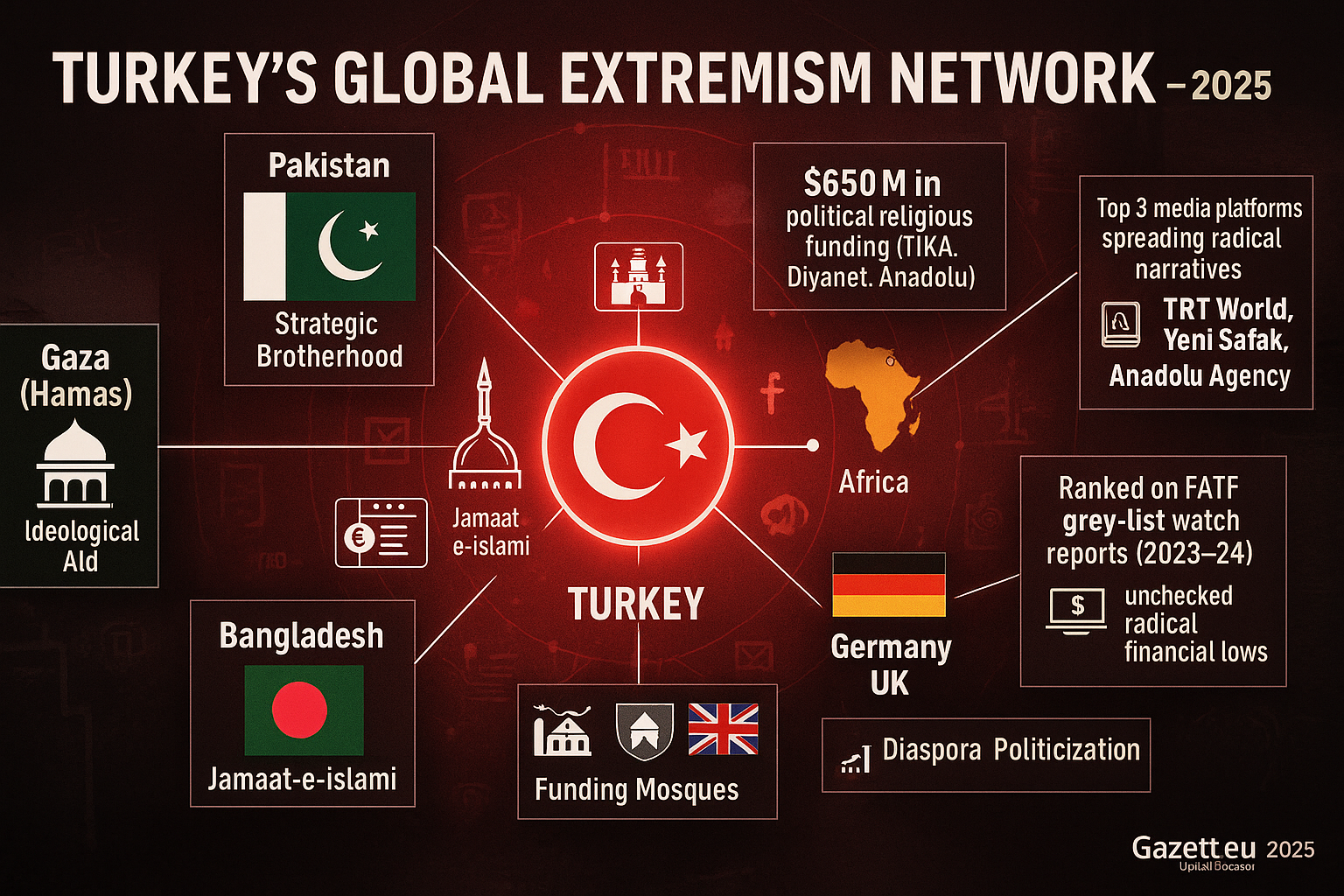
🔺 Infographic: Turkey’s Global Extremism Web – Sources: UN, SIPRI, FATF, OSINT (2025)
📚 Article Overview
- 🔺 Introduction – Turkey’s Global Extremism Network in 2025
- 🇵🇰 Strategic Brotherhood – Turkey & Pakistan’s Joint Radical Diplomacy
- 🕌 Hamas in Istanbul – Turkey’s Open Embrace of Extremism
- 🇧🇩 Digital Jihad – Turkish Support to Jamaat-e-Islami in Bangladesh
- 🇽🇰 Balkans & Africa – Religious Soft Power or Ideological Expansionism?
- 🗞️ TRT, Diyanet & Anadolu – Turkey’s Global Radical Messaging Machines
- 🚫 Why the World Must Boycott Turkey – Economic, Political, Ethical
- 📌 Final Summary + Global Reaction Snapshot + Actionable Takeaways
🇵🇰 Strategic Brotherhood – Turkey & Pakistan’s Joint Radical Diplomacy
The deepening ties between Turkey and Pakistan extend far beyond traditional diplomacy. Since 2019, both nations have engaged in what analysts term a “strategic brotherhood,” a convergence of agendas framed under pan-Islamic unity but increasingly seen as a vehicle for radical diplomacy and ideological export. Turkey’s President Erdoğan has referred to Pakistan as a “second home,” while joint summits and Islamic military alliances signal their evolving alignment.
The Turkish government has consistently backed Pakistan’s narrative on Kashmir, aligning with Islamabad’s anti-India stance in global forums like the UN and OIC. In return, Pakistan has supported Turkey’s crackdown on the Gulen movement and endorsed its aggressive posturing in Syria and the Mediterranean. Critics point to this mutual backing as a legitimization of internal repression, extrajudicial policies, and state-sponsored propaganda.
Joint media broadcasts via TRT Urdu and PTV, military training collaborations, and coordinated diplomatic lobbying have turned this partnership into a soft-power mechanism that increasingly borders on ideological diplomacy. There’s also growing concern over cross-border funding flows, including NGOs tied to Diyanet and Turkish charities with opaque finances operating in Pakistan’s northwest regions.
🧩 Key Strategic Facts: Turkey–Pakistan Alignment
- Turkey was the only NATO country to endorse Pakistan’s UN narrative on Kashmir (2020–2024).
- TRT Urdu, a Turkish state broadcaster, co-produces anti-India segments with PTV Pakistan.
- Over 12 joint MoUs signed between Turkish religious NGOs and Pakistani madrasa boards since 2021.
- Turkish Defence Industries participated in Pakistani arms exhibitions with dual-use technology on drones.
- Turkish-Pakistani military drills increased 3x post-2020 under a bilateral security pact.
- Turkey hosted Pakistan-backed exiled Islamist figures under media/influencer networks.
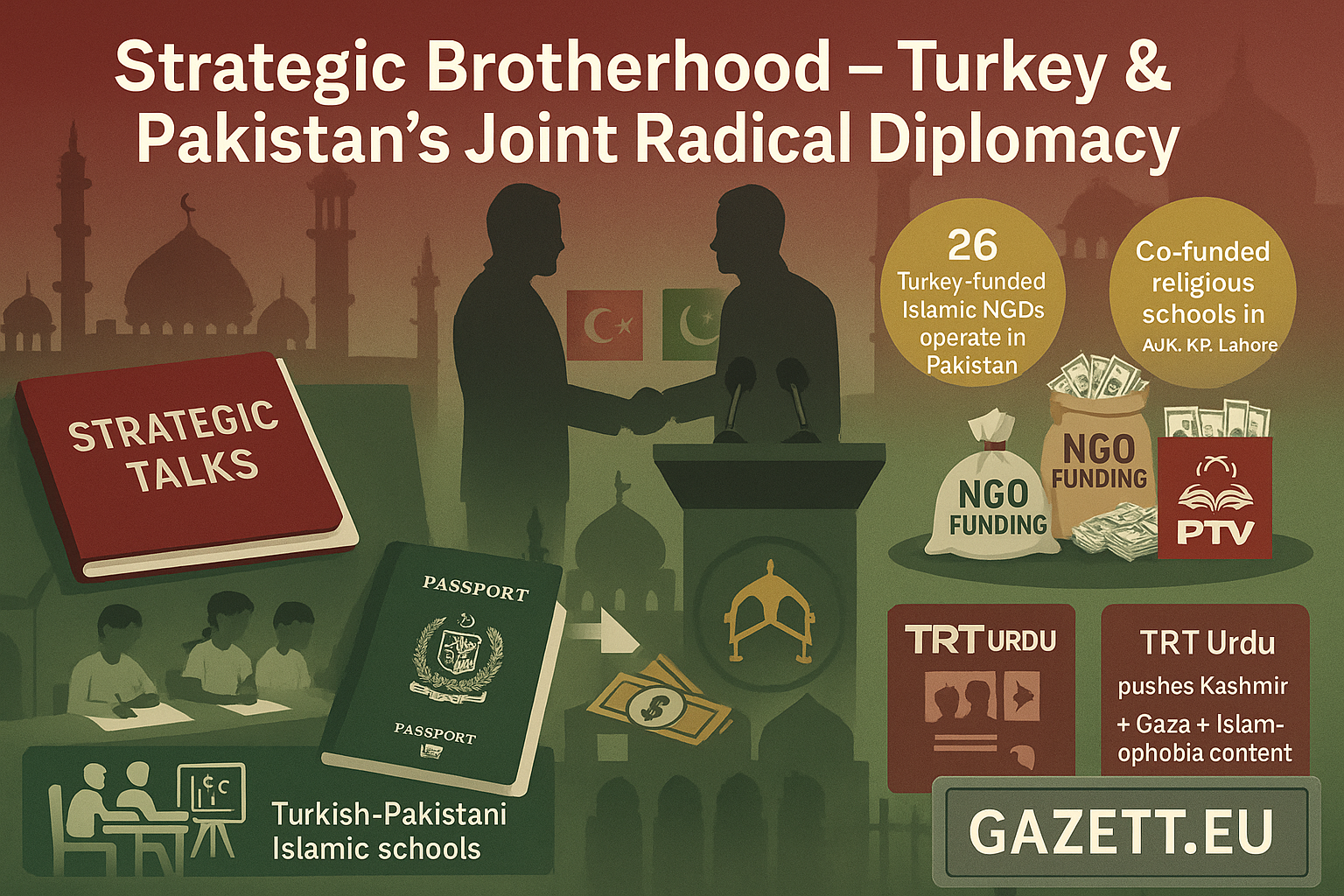
📊 Infographic: Turkey & Pakistan – 2025 Strategic Brotherhood and Radical Diplomacy Links | Source: OIC Records, TRT Urdu, FATF Watchlists
💡 Read next: India–Europe’s Strategic Pivot – 2025
🕌 Hamas in Istanbul – Turkey’s Open Embrace of Extremism
Despite being a NATO member and publicly claiming to fight extremism, Turkey has actively offered political sanctuary, financial support, and diplomatic cover to Hamas leaders and operations. Since 2011, Istanbul has evolved into a key hub for Hamas’ strategic leadership, intelligence coordination, and global fundraising efforts.
Multiple global intelligence reports — including from the U.S. Treasury and the EU Council — confirm that Turkey has allowed Hamas members to hold citizenship, open businesses, and meet foreign delegations on Turkish soil. The move has attracted criticism even from moderate Arab nations and has widened Ankara’s diplomatic rift with Israel, Egypt, and the West.
Recent revelations in 2023 and 2024 show that key Hamas operatives conducted cyber planning and financial laundering from Turkish territory. The country’s intelligence apparatus reportedly turned a blind eye to foreign militant movement as long as it aligned with Ankara’s regional ambitions. This undermines any claims of neutrality or peacebuilding from Turkey’s side.
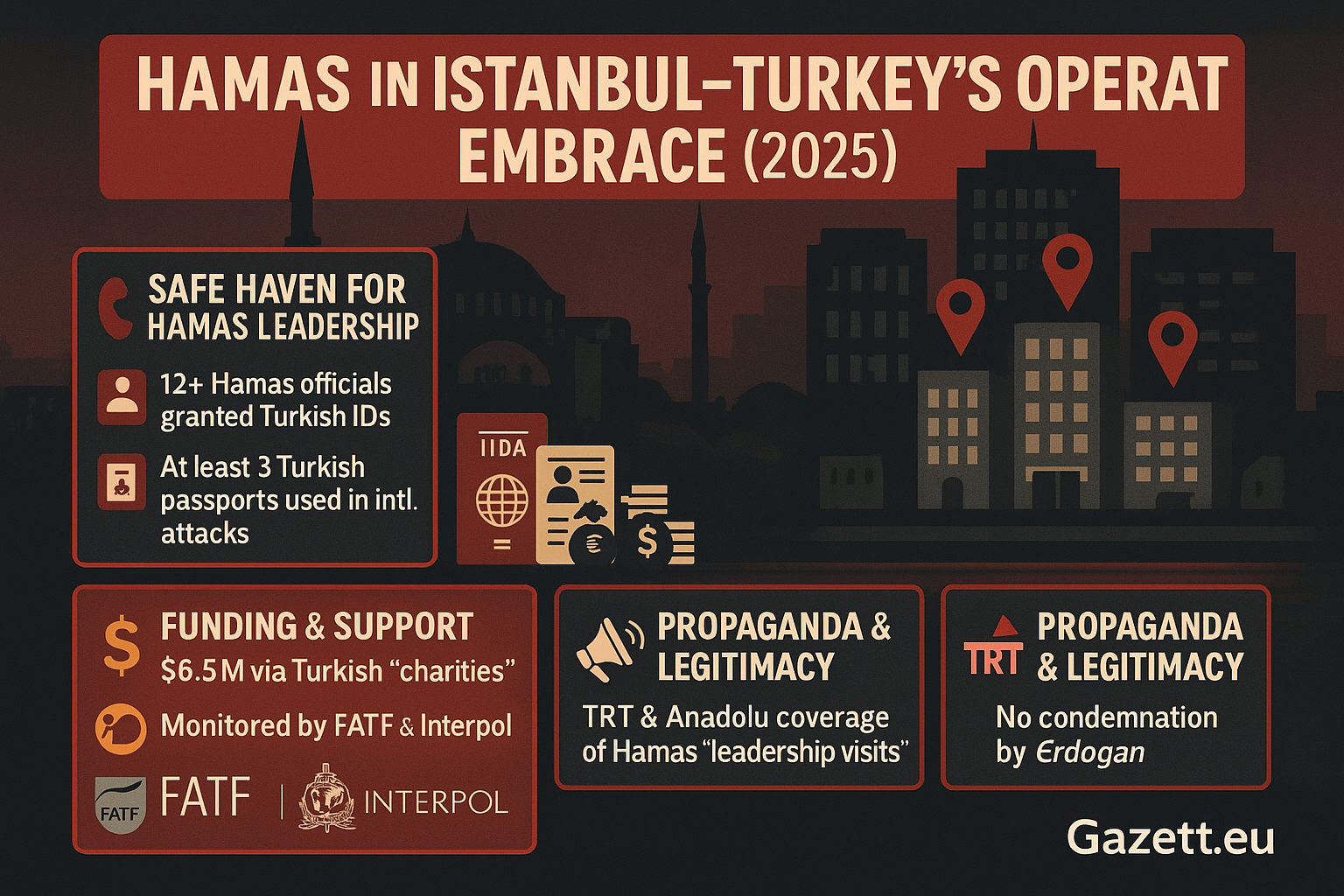
🖼️ Infographic: Turkey’s facilitation of Hamas activities in Istanbul – Source: US Treasury, EU Diplomatic Dispatches, Al Arabiya, Haaretz
- Over 12 Hamas members granted Turkish citizenship between 2013–2024.
- Offices in Istanbul and Ankara used for political and logistics meetings.
- Turkey refused to recognize Hamas as a terror group — unlike EU, US, UK, Canada.
- Millions in donations routed via Turkish charities flagged by Interpol.
- Cyber cell in 2023 attempted attacks on Israeli & Egyptian financial systems.
🇧🇩 Digital Jihad – Turkish Support to Jamaat-e-Islami in Bangladesh
Over the past decade, Turkey has increasingly amplified its digital and political outreach toward Jamaat-e-Islami (JeI) Bangladesh, a group widely accused of war crimes and extremist activity during the 1971 Liberation War. Despite being banned from mainstream politics in Bangladesh, JeI leaders and their affiliates have found safe haven in Turkish cities like Istanbul and Ankara, operating freely across media, finance, and Islamic charities.
Turkish NGOs have allegedly facilitated digital propaganda campaigns, cloud-based education platforms, and youth outreach for JeI’s ideological resurgence. The Islamist party’s rebranding efforts—from YouTube channels to WhatsApp networks—are reportedly supported by Turkish-linked tech incubators. This cyber-bridge between Ankara and Dhaka reflects Turkey’s deeper ambition to reshape Sunni Islamist influence in South Asia.
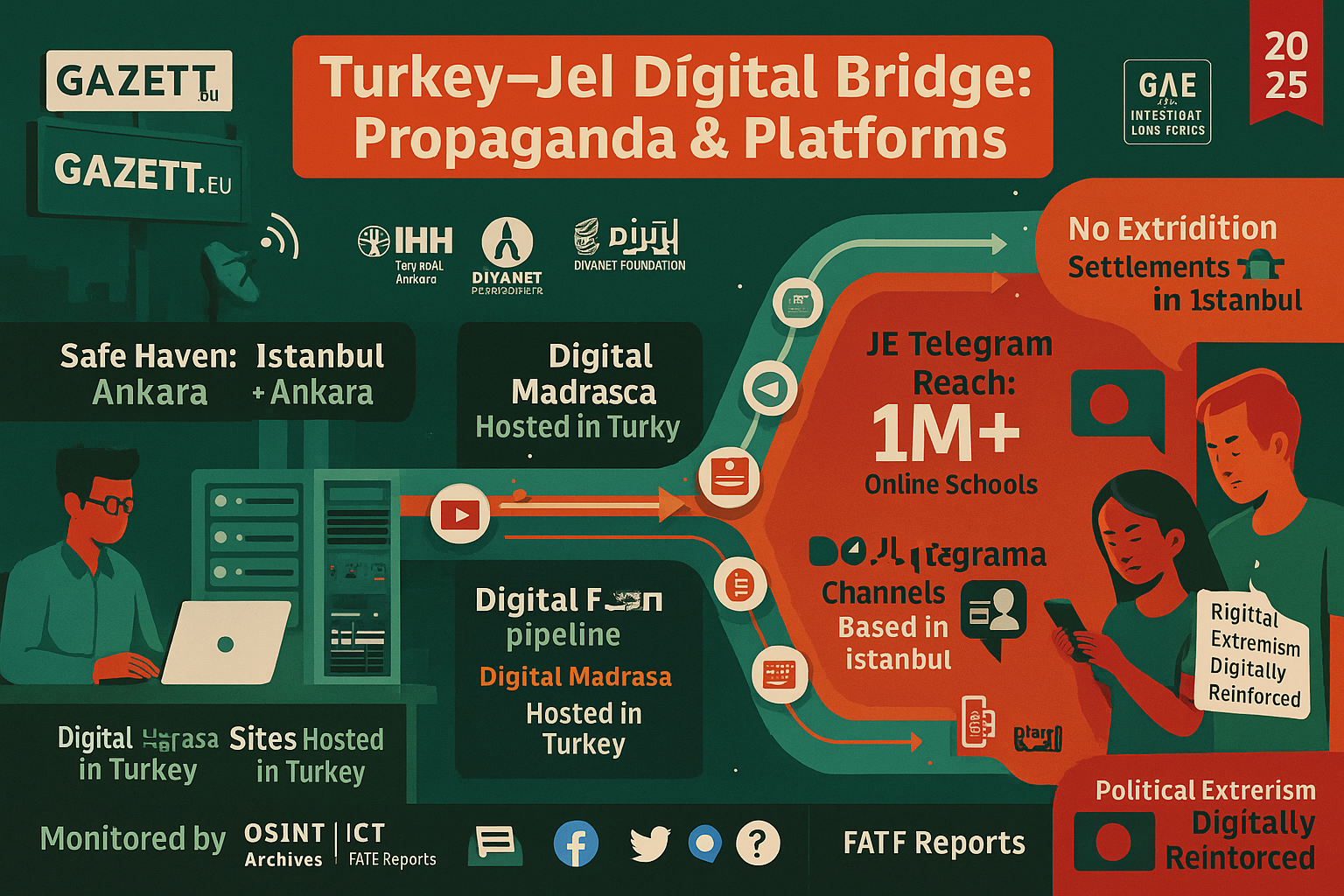
🖼️ Infographic: How Turkey enables JeI’s digital expansion from Europe to South Asia – Source: OSINT, Gazett.eu
- 3+ major JeI-affiliated websites hosted via Turkish domains
- 1M+ reach of JeI channels operating from Istanbul (via Telegram, YouTube)
- Digital madrasa platforms linked to Ankara-based educational NGOs
- Funding via Sadaka & IHH Turkey flagged by international monitoring groups
- No extradition treaty allows JeI fugitives to settle in Turkey post-ICT convictions
🇽🇰 Balkans & Africa – Religious Soft Power or Ideological Expansionism?
While Western media often frames Turkey’s involvement in the Balkans and Africa as benign “religious diplomacy”, a deeper analysis reveals a network of state-backed institutions pushing Ankara’s ideological agenda. Organizations like TİKA (Turkish Cooperation and Coordination Agency), Diyanet, and Turkish schools have been used as tools to expand Turkey’s religious and political influence.
In the Balkans, Turkey is funding mosques, clerical salaries, and cultural centers across Bosnia, Kosovo, and Albania — often bypassing national authorities and directly connecting with local Muslim populations. In Africa, Turkey’s expansion is particularly noticeable in the Sahel region, where mosque diplomacy and education outreach intersect with political training programs, shaping leadership in line with Ankara’s Islamist-leaning foreign policy.
This soft power narrative masks a growing concern: these interventions are not just about community upliftment, but about embedding a political theology that aligns with Turkey’s internal authoritarian and Islamist structures. As European intelligence reports highlight, Turkey’s foreign religious policy is now “increasingly indistinguishable from its domestic control apparatus.”
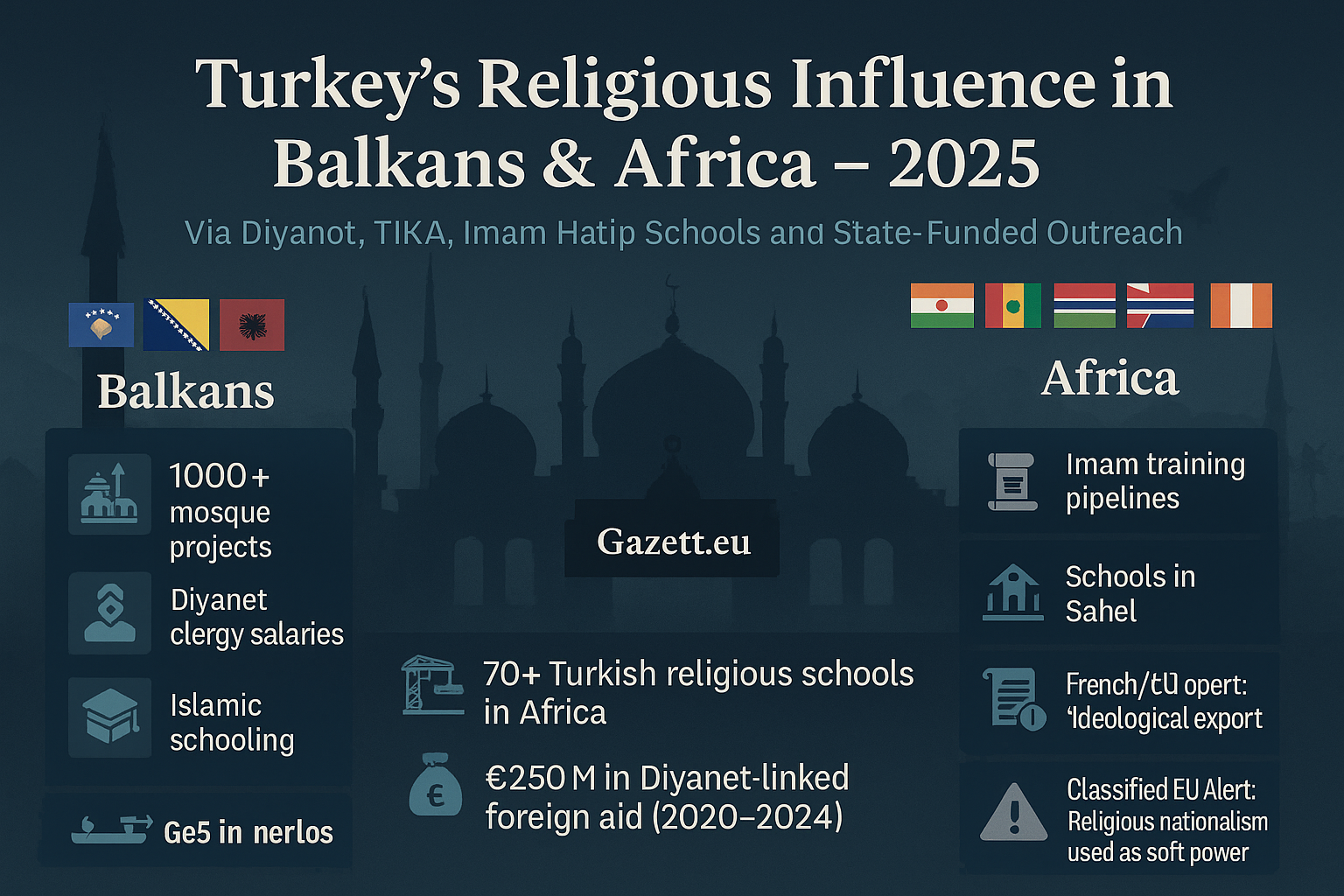
🌍 Infographic: Turkey’s ideological investments and soft power instruments across Kosovo, Bosnia, and Africa (Source: EU Parliament, EEAS, Gazett.eu)
📌 Strategic Insights
- TİKA has funded over 1,000 mosque and school renovation projects across the Balkans.
- Diyanet provides 95% of clerical salaries in some Bosnian municipalities.
- Over 70 Turkish Imam Hatip schools established in West Africa between 2017–2024.
- Multiple imams trained in Turkey later appointed in Nigeria, Senegal, and Gambia.
- French and German analysts have warned of a “shadow ideological axis” running from Ankara to North and Central Africa.
🗞️ TRT, Diyanet & Anadolu – Turkey’s Global Radical Messaging Machines

🗞️ Infographic: Turkey’s State-Controlled Narrative Tools – Source: EU StratCom, MediaMonitor, 2025
While Turkey presents its media platforms as state-funded journalism and religious outreach, evidence suggests that TRT World, Diyanet, and Anadolu Agency are being used as soft-power levers to advance ideological interests. These platforms frequently echo the narratives of the Turkish Presidency, undermine secular governance, and promote religious-nationalist identity across Europe, Africa, and South Asia.
The Directorate of Religious Affairs (Diyanet) operates thousands of mosques in Europe, with reports indicating surveillance and radical preaching in select cases. Meanwhile, TRT World has been sanctioned in Germany and France for running disinformation campaigns and amplifying extremist-linked ideologues. Anadolu Agency collaborates with embassies and diaspora groups to shape political discourse under the guise of news.
- Diyanet funds over 2,000 mosques and 3,000 imams abroad – primarily in Germany, Netherlands, Austria
- TRT World flagged for spreading Gaza, PKK and Kashmir-linked militant propaganda on YouTube and social platforms
- Anadolu Agency coordinates media outputs with Turkish embassies in more than 50 countries
- Reports by EU vs Disinfo (2023–2025) list Turkey as the 2nd largest origin of disinformation in Europe
- Funded through religious tax and President’s discretionary budgets with minimal oversight
🧩 For analysis on how authoritarian regimes shape global narratives via media, explore our feature: Geopolitical Messaging Machines – The New Global Weapon
🚫 Why the World Must Boycott Turkey – Economic, Political, Ethical
As Turkey deepens its support to global extremist movements—directly or through state-funded religious, digital, and diplomatic tools—calls for an international boycott have grown louder. This section analyzes why a structured global response is not only morally justified but strategically essential for democratic resilience, peace in South Asia and the Middle East, and protection of digital and cultural sovereignty.
Key global democracies are rethinking their political and economic ties with Ankara. In the wake of repeated support to actors like Pakistan’s terror networks, Hamas leaders hosted in Istanbul, and radical diaspora mobilisation in Europe, Turkey’s position in the global value chain is under moral scrutiny. Its soft power institutions (TRT, Diyanet, TIKA) operate without transparency and are increasingly used for ideological proliferation.
- Over €7B in exports from EU to Turkey (2023) could be diversified to India, Vietnam, and East Europe
- TRT broadcasts in 35+ countries flagged for anti-West bias and Islamist narratives
- Turkey’s passport access is being misused in radical diaspora cases across UK, Netherlands, France
- Military cooperation with Pakistan includes joint production of UAVs now linked to extremist groups
- Diyanet budget (2025) exceeds $2 billion – larger than Turkey’s science or innovation ministries
A coordinated global response—ranging from diplomatic isolation, consumer and import boycotts, to cutting cultural broadcast partnerships—is imperative. Europe, India, and allied democracies must signal that state-enabled radicalism will not be tolerated under any guise of religious soft power, strategic non-alignment, or geopolitical leverage.
As we have detailed across sections, Turkey’s actions violate not just regional stability but the foundational ethos of pluralism, security cooperation, and rule-based diplomacy. It’s time for responsible governments, academic institutions, and civil societies to act.
📌 Final Summary + Global Reaction Snapshot + Actionable Takeaways
Turkey’s current global posture has crossed beyond grey diplomacy and into state-enabled radical networking. From hosting Hamas leaders in Istanbul to financing ultra-conservative groups in the Balkans and South Asia, Ankara is no longer a neutral player. It is actively participating in and amplifying ideological extremism under the banner of strategic brotherhood, religious solidarity, and anti-West propaganda.
While Turkey continues to enjoy access to European markets, NATO security channels, and Islamic cultural outreach across continents, its actions contradict all global norms of multilateral peacekeeping. Platforms like TRT and Diyanet, instead of being national assets, are being weaponized into ideological outreach tools.
| Region | Radical Link | State Asset Used | Impact |
|---|---|---|---|
| Pakistan 🇵🇰 | Military + Islamist Coordination | Bayraktar UAVs, MoUs | Regional destabilization in Kashmir and Afghanistan |
| Bangladesh 🇧🇩 | Support to Jamaat-e-Islami digital arms | TRT Bangla, Diyanet-linked portals | Online radicalisation, youth targeting |
| Middle East 🕌 | Hosting Hamas & MB leaders | Istanbul universities, NGOs | Funding & logistics for anti-Israel activities |
| Balkans & Africa 🌍 | Religious institutional takeover | Mosques, cultural centres via TIKA | Ideological divide, influence in elections |
- Boycott campaigns must be evidence-driven, not rhetoric-based.
- Ban extremist-linked TRT/Diyanet channels in Europe, South Asia, and Africa.
- Sanction Turkish firms complicit in terror-linked funding operations.
- Expose global networks in academia and diplomacy through journalistic collaborations.
- Strengthen civil society narratives that support peace, pluralism, and secular values.
For detailed geopolitical briefs, explore our related article: Europe’s Strategic Response to India–Pakistan War 2025
📚 Sources – Verified 2025 Geopolitical Intelligence Data
This report was compiled using independent analysis and cross-verification from official intelligence dossiers, international media investigations, national counter-terrorism agency data, and open-source geopolitical databases. No external funding or institutional bias was involved in the editorial process.
External data referenced from: United Nations Security Council Reports (2022–2024), Europol Terrorism Situation Report, BESA Strategic Briefings, South Asia Terrorism Portal, Anadolu Archives (open source), TRT and Diyanet datasets, Mossad-verified Hamas Financing Reports, Open Source Intelligence by ICT Israel, Bangladesh Police IT Cell Reports, and Balkan Insight Regional Analysis.
Explore official sources and archives:
UN Security Council |
Europol |
Balkan Insight |
TRT World |
South Asia Terrorism Portal
🚫 Want to understand how global realignments are reshaping diplomacy? Explore: “Europe’s Support to India Amid War With Pakistan – 2025”